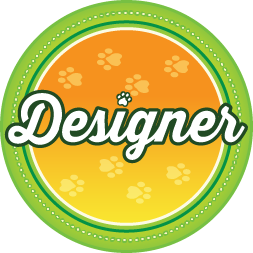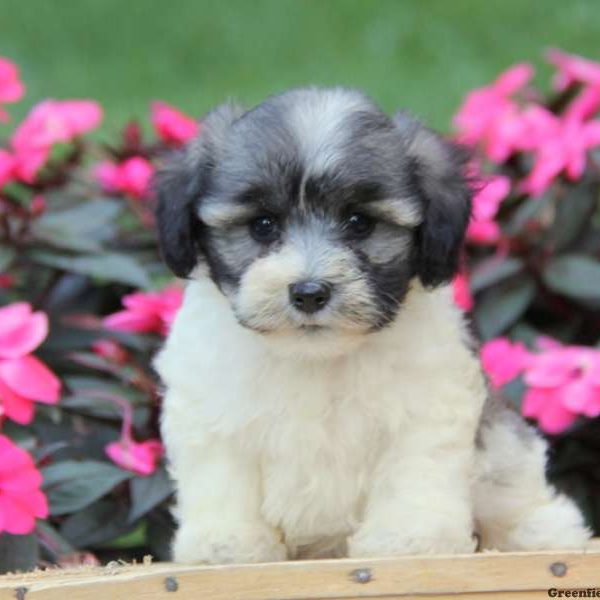
-
Activity Level:
moderate
-
Shedding Level:
low
-
Grooming Level:
high
-
Trainability:
high
-
Good for Novice Owners:
moderate
-
Adaptability:
high
-
Kid/Pet Friendly:
often
-
Prey Drive:
high
-
Watchdog:
very alert
- Average Size: Small
- Average Lifespan: 10-13 years
- Registered?: other
Chonzer Dog Breed Information
Overview
Temperament
Adaptability
Health
Owner Experience
Grooming
Activity Level
Size
Life Span
The Chonzer is a cross between a Bichon Frise and a Miniature Schnauzer. In general, Chonzers tend to be affectionate, loving dogs with energetic, playful personalities. They are true companions that love to be by your side.
Although the Chonzer is not currently recognized by the American Kennel Club, they are recognized by other notable dog registries. The American Canine Hybrid Club, Designer Dogs Kennel Club, International Designer Canine Registry, and more all recognize the Chonzer.
Chonzers are companion dogs that tend to enjoy being lapdogs and love being near their favorite humans. They tend to be affectionate with a gentle, cheerful nature and a playful personality.
These little dogs tend to get along well with children, other pets in the family, and other dogs. They do tend to have a high prey drive, so you will want to spend some extra time socializing them with smaller pets in the household.
A Chonzer is a highly adaptable dog that does well in apartments as well as larger homes. They bond closely with their families, so do not like being left alone for long periods of time. Because of their high prey drive and urge to chase, you will need to be careful when and where you let them off-leash.
Although mixed-breed dogs can sometimes be healthier than purebred dogs, it’s not a guarantee and reputable breeding practices are essential. Just as a mix can inherit none of the conditions common to their parent breeds, they could also inherit some or all of them.
Potential health concerns to be aware of in a Chonzer include epilepsy, Von Willebrand’s Disease, hip dysplasia, luxating patella, hemophilia, and myotonia. These little dogs can also be prone to ear infections and allergies.
Reputable breeders will screen their dogs to avoid passing preventable issues to puppies. So, make sure you are asking about the health history of both of the parents and about any health tests or clearances that have been done.
Chonzers are highly intelligent dogs that pick up on things quickly and are eager to please. This makes them highly trainable and a great fit for owners of all experience levels. As long as training is consistent and focused on positive reward and praise, a Chonzer tends to pick up basic commands quickly and also enjoys learning new tricks.
Although the Chonzer is known for having a low-shedding coat, the color and type can vary slightly. Generally, Chonzers have a double-coat that features a soft undercoat and a thick topcoat that can range from wavy to curly. Chonzer coats can be salt and pepper as puppies and can turn white or gray as they grow up. They can also have brown or black coats.
The Chonzer may be low-shedding, but their coat does require some maintenance, especially if it is on the curlier side. If their coat is just a little wavy, you can likely get away with brushing a few times a week. If it’s curlier, you’ll likely need to brush every day to remove tangles and prevent mats. Bathing is on an as-needed basis at home, but professional grooming is recommended every 4-8 weeks.
In addition to coat care, you will also need to take care of your Chonzer’s nails, ears, and teeth. If you’re seeing the groomer regularly, they can help with some of these tasks. But, you will still need to take care of them at home between grooming visits. Nail trims once or twice monthly keep them from growing too long.
Checking ears weekly and carefully cleaning them as needed can help prevent ear infections. As a small dog breed, the Chonzer is more prone to developing gum disease and other dental problems later in life. This makes good dental care early and throughout their life even more important. Daily brushing or use of an enzyme toothpaste in addition to cleanings at the vet as needed is ideal.
Although they are small, the Chonzer is an active, energetic little dog. They won’t run you ragged, but they do need a moderate amount of activity every day to be happy and healthy.
Daily walks plus some playtime and time to run is usually enough, but they will definitely be up for more if you are. Chonzers are study and athletic little dogs that have been known to do well in agility. Plus, since they tend to like to chase, you can often easily teach them to play frisbee or fetch.
A fully-grown Chonzer usually stands 10-16 inches tall and weighs 25-35 pounds.
Chonzers generally live for 10-13 years.






